The Jackson Wild Summit Fellowship is dedicated to elevating diverse and creative perspectives of storytellers for the conservation, protection and restoration of our natural world. The program is designed to provide networking experience, curated mentorship and professional development opportunities that will enable the participants to interact and learn from some of the world's greatest media content creators.
Meet the 2021 Jackson Wild Media Lab Fellows and
the 2021 African Conservation Voices: Kenya Media Lab Fellows!
the 2021 African Conservation Voices: Kenya Media Lab Fellows!
Multicultural Alliance Fellows
We are thrilled to partner with the National Multicultural Alliance to launch the Jackson Wild Multicultural Alliance Fellowship. This unique fellowship was created specifically for mid-career and established media professionals who may have not previously been plugged into the natural history and conservation filmmaking sectors, to attend the Jackson Wild Summit so that they may explore potential pathways into this branching industry. Stories and media have the incredible power of provoking emotion and changing behaviors. As climate change continues to escalate and challenge life on planet earth, the lines between different media sectors including documentary, human interest, science, conservation and social justice are blurring, and films and stories can span them all. The Jackson Wild Multicultural Alliance Fellowship is made possible by the generous support from Center for Asian American Media (CAAM), Latino Public Broadcasting (LBP), Pacific Islanders in Communications (PIC), Vision Maker Media (VMM), HHMI Tangled Bank Studios, and Smithsonian Channel.
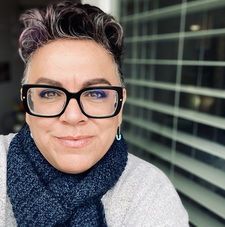
Roni Jo Draper, Vision Maker Media
Provo, Utah
Roni Jo Draper, Ph.D. (Yurok|she.her) is a Professor in the David O. McKay School of Education at Brigham Young University, where she teaches courses in literacy, multicultural education, and women’s studies. Her research interests focus on teacher education and the challenge of preparing teachers to create inclusive classrooms. In her recent work she has turned to Indigenous storytelling to share stories that center the lives of Indigenous peoples. She has produced the film SCENES FROM THE GLITTERING WORLD (which premiered at Full Frame Film Festival 202) about the in- and out-of-school lives of three Navajo young people. Roni Jo is also the writer, producer, director of the upcoming documentary FIRE TENDER, which centers the lives of Yurok fire practitioners who are returning fire to the land. Additionally, Roni Jo works as an advocate for social justice in her community where she serves as the Chair of the Board of the ACLU of Utah, the Vice-President of PFLAG Provo/Utah County, and on the National Board of the ACLU.
Provo, Utah
Roni Jo Draper, Ph.D. (Yurok|she.her) is a Professor in the David O. McKay School of Education at Brigham Young University, where she teaches courses in literacy, multicultural education, and women’s studies. Her research interests focus on teacher education and the challenge of preparing teachers to create inclusive classrooms. In her recent work she has turned to Indigenous storytelling to share stories that center the lives of Indigenous peoples. She has produced the film SCENES FROM THE GLITTERING WORLD (which premiered at Full Frame Film Festival 202) about the in- and out-of-school lives of three Navajo young people. Roni Jo is also the writer, producer, director of the upcoming documentary FIRE TENDER, which centers the lives of Yurok fire practitioners who are returning fire to the land. Additionally, Roni Jo works as an advocate for social justice in her community where she serves as the Chair of the Board of the ACLU of Utah, the Vice-President of PFLAG Provo/Utah County, and on the National Board of the ACLU.
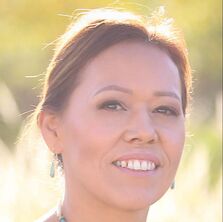
Katsitsionni Fox, Vision Maker Media
Akwesasne, New York
Katsitsionni Fox is a Mohawk filmmaker sharing empowering stories of resilient Indigenous women. Her debut film was the award winning Ohero:kon - Under the Husk a 26-min documentary following the journey of two Mohawk girls as they take part in their traditional passage rites to becoming Mohawk Women. Katsitsionni received the Jane Glassco Award for Emerging Filmmaker at the imagineNATIVE Film Festival in 2016 as well as the Achievement in Documentary Filmmaking Award at LA Skins Fest in 2016. This film received funding from Vision Maker Media and has been broadcast on many PBS stations since 2017. Her most recent film, Without a Whisper - Konnon:kwe is untold story of how Indigenous women influenced the early suffragists in their fight for freedom and equality. Without a Whisper received an audience award at Woods Hole Film Festival, Best Short Film Winner at Female Voices Rock Film Festival and Best Documentary Short at Red Nations Film. Katsitsionni has been selected as a 2021 Nia Tero Storytelling Fellow, focused on amplifying Indigenous creatives working on innovative projects rooted in culture, environment and story. She is currently in production for Kanenon:we - Original Seeds a documentary on Indigenous women seed keepers protecting and rematriating our seed relatives for future generations.
Akwesasne, New York
Katsitsionni Fox is a Mohawk filmmaker sharing empowering stories of resilient Indigenous women. Her debut film was the award winning Ohero:kon - Under the Husk a 26-min documentary following the journey of two Mohawk girls as they take part in their traditional passage rites to becoming Mohawk Women. Katsitsionni received the Jane Glassco Award for Emerging Filmmaker at the imagineNATIVE Film Festival in 2016 as well as the Achievement in Documentary Filmmaking Award at LA Skins Fest in 2016. This film received funding from Vision Maker Media and has been broadcast on many PBS stations since 2017. Her most recent film, Without a Whisper - Konnon:kwe is untold story of how Indigenous women influenced the early suffragists in their fight for freedom and equality. Without a Whisper received an audience award at Woods Hole Film Festival, Best Short Film Winner at Female Voices Rock Film Festival and Best Documentary Short at Red Nations Film. Katsitsionni has been selected as a 2021 Nia Tero Storytelling Fellow, focused on amplifying Indigenous creatives working on innovative projects rooted in culture, environment and story. She is currently in production for Kanenon:we - Original Seeds a documentary on Indigenous women seed keepers protecting and rematriating our seed relatives for future generations.
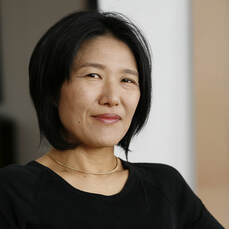
Ann Kaneko, Center for Asian American Media
Los Angeles, California
ANN KANEKO is an Emmy Award winner, known for her personal films that weave her intimate aesthetic with the complex intricacies of political reality. Her poetic feature, MANZANAR, DIVERTED: WHEN WATER BECOMES DUST, premiered at the 2021 Big Sky Film Festival and won honorable mentions at CAAMFest and Milwaukee Film festivals. She has screened internationally and been commissioned by the National Endowment for the Arts, the California Endowment and the Skirball Cultural Center. Other films include A FLICKER IN ETERNITY, based on Stanley Hayami’s diary; AGAINST THE GRAIN: AN ARTIST’S SURVIVAL GUIDE TO PERU, highlighting Peruvian political artists; OVERSTAY, about Japanese undocumented workers, and 100% HUMAN HAIR, a musical for the AFI Directing Workshop for Women. Fluent in Japanese and Spanish, Kaneko has been a Fulbright, Japan Foundation Artist and Film Independent Doc Lab fellow and funded by JustFilms/Ford, the Redford Center, CAAM, Vision Maker Media, Firelight Media and Hoso Bunka Foundation. She is a member of BGDM, A-Doc and New Day Films, a distribution coop. She teaches at Pitzer College and is the artist mentor for Visual Communication’s Armed with a Camera Fellowship.
Los Angeles, California
ANN KANEKO is an Emmy Award winner, known for her personal films that weave her intimate aesthetic with the complex intricacies of political reality. Her poetic feature, MANZANAR, DIVERTED: WHEN WATER BECOMES DUST, premiered at the 2021 Big Sky Film Festival and won honorable mentions at CAAMFest and Milwaukee Film festivals. She has screened internationally and been commissioned by the National Endowment for the Arts, the California Endowment and the Skirball Cultural Center. Other films include A FLICKER IN ETERNITY, based on Stanley Hayami’s diary; AGAINST THE GRAIN: AN ARTIST’S SURVIVAL GUIDE TO PERU, highlighting Peruvian political artists; OVERSTAY, about Japanese undocumented workers, and 100% HUMAN HAIR, a musical for the AFI Directing Workshop for Women. Fluent in Japanese and Spanish, Kaneko has been a Fulbright, Japan Foundation Artist and Film Independent Doc Lab fellow and funded by JustFilms/Ford, the Redford Center, CAAM, Vision Maker Media, Firelight Media and Hoso Bunka Foundation. She is a member of BGDM, A-Doc and New Day Films, a distribution coop. She teaches at Pitzer College and is the artist mentor for Visual Communication’s Armed with a Camera Fellowship.
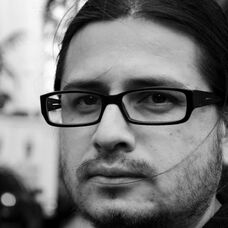
Raúl Paz-Pastrana, Latino Public Broadcasting
Denver, Colorado
Raúl is a Mexican immigrant filmmaker, cinematographer, and multimedia creator based in Denver, Colorado. His work intersects contemporary art, political documentary, and visual ethnography to explore themes of belonging, alienation, and the concept of “home.” Raul often collaborates with BIPOC artists, filmmakers, and academics that are working on bold artistic projects that expose racism and xenophobia, such as the worldwide "Hostile Terrain94" installation and the "Coyotek project" interactive website. His films have screened at museums and festivals worldwide including at the Sheffield Doc/Fest in the U.K., The American Museum of Natural History in New York City, MASS MoCA Museum in Massachusetts, Museum of the Moving Image (MoMI) in New York City, and at the Guadalajara International Film Festival (FICG) in Mexico among many more. Raúl’s work has received support from the Princess Grace Foundation, the Ford Foundation-Just Films, The LEF Foundation, ITVS, Catapult Film Fund, The Jerome Foundation, New York Council on the Arts, The Tribeca Film Institute, The Colorado Humanities, and the Sundance Institute among others. He is a Camargo Foundation Cassis France Artist Alumni, an IFP/Gotham Filmmaker Labs fellow, a Firelight Media Documentary Lab Fellow, and a New America National Fellow.
Denver, Colorado
Raúl is a Mexican immigrant filmmaker, cinematographer, and multimedia creator based in Denver, Colorado. His work intersects contemporary art, political documentary, and visual ethnography to explore themes of belonging, alienation, and the concept of “home.” Raul often collaborates with BIPOC artists, filmmakers, and academics that are working on bold artistic projects that expose racism and xenophobia, such as the worldwide "Hostile Terrain94" installation and the "Coyotek project" interactive website. His films have screened at museums and festivals worldwide including at the Sheffield Doc/Fest in the U.K., The American Museum of Natural History in New York City, MASS MoCA Museum in Massachusetts, Museum of the Moving Image (MoMI) in New York City, and at the Guadalajara International Film Festival (FICG) in Mexico among many more. Raúl’s work has received support from the Princess Grace Foundation, the Ford Foundation-Just Films, The LEF Foundation, ITVS, Catapult Film Fund, The Jerome Foundation, New York Council on the Arts, The Tribeca Film Institute, The Colorado Humanities, and the Sundance Institute among others. He is a Camargo Foundation Cassis France Artist Alumni, an IFP/Gotham Filmmaker Labs fellow, a Firelight Media Documentary Lab Fellow, and a New America National Fellow.
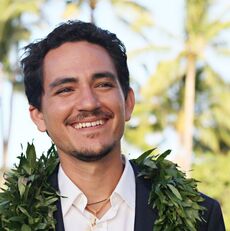
Sergio M. Rapu, Pacific Islanders in Communications
Minneapolis, Minnesota
Native Rapanui (Easter Island) filmmaker Sergio Mata’u Rapu has produced documentary specials and series that have aired on History Channel, TRVL, Discovery, National Geographic, and PBS. His award-winning directorial debut, EATING UP EASTER, was screened around the world and broadcast on PBS’s Independent Lens in 2020. He has partnered with Dakota/Dine director Leya Hale to produce and edit his latest feature, BRING HER HOME, a character-driven story about the missing and murdered indigenous women epidemic. As one of the only native Rapanui working in documentary film, he seeks to foster BIPOC stories and storytellers while creating thought-provoking media that highlights the complexity of life to inspire resolutions to social, economic, and environmental conflicts.
Minneapolis, Minnesota
Native Rapanui (Easter Island) filmmaker Sergio Mata’u Rapu has produced documentary specials and series that have aired on History Channel, TRVL, Discovery, National Geographic, and PBS. His award-winning directorial debut, EATING UP EASTER, was screened around the world and broadcast on PBS’s Independent Lens in 2020. He has partnered with Dakota/Dine director Leya Hale to produce and edit his latest feature, BRING HER HOME, a character-driven story about the missing and murdered indigenous women epidemic. As one of the only native Rapanui working in documentary film, he seeks to foster BIPOC stories and storytellers while creating thought-provoking media that highlights the complexity of life to inspire resolutions to social, economic, and environmental conflicts.
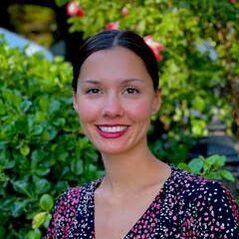
Stacey Rice, Vision Maker Media
Los Angeles, California
Stacey is the daughter of an enrolled Tuscarora and passionate about Native culture and storytelling. She has worked in the Casting department for over 10 years and was recently accepted into the Casting Society of America. She’s worked on various films and television shows including but not limited to the Emmy-nominated series EUPHORIA (HBO) and AMERICAN CRIME (ABC), as well as THE LEFTOVERS (HBO), ALITA BATTLE ANGEL, WE CAN BE HEROES (Netflix) and FOX’s DEPUTY. Her casting experience and personal background have led her to specialize in Native American/Indigenous casting and working with Native writers, directors and storytellers. She was selected by the Casting Society of America for a prestigious mentorship program based on her passion for authentic representation of Native people and communities in the media, especially as it relates to television and film. This mentorship led to an opportunity as a Casting Associate on the first TV series with an all Native writers' room, as well as a Native Showrunner and Creator on the series RESERVATION DOGS, currently airing on FX. Stacey is passionate about telling Native stories that highlight the culture, environmental issues and lives of Indigenous peoples. She's currently working in research and development on her own documentary film where her goal is to create a greater awareness and positive change as it relates to the many issues that Native Americans face today.
Los Angeles, California
Stacey is the daughter of an enrolled Tuscarora and passionate about Native culture and storytelling. She has worked in the Casting department for over 10 years and was recently accepted into the Casting Society of America. She’s worked on various films and television shows including but not limited to the Emmy-nominated series EUPHORIA (HBO) and AMERICAN CRIME (ABC), as well as THE LEFTOVERS (HBO), ALITA BATTLE ANGEL, WE CAN BE HEROES (Netflix) and FOX’s DEPUTY. Her casting experience and personal background have led her to specialize in Native American/Indigenous casting and working with Native writers, directors and storytellers. She was selected by the Casting Society of America for a prestigious mentorship program based on her passion for authentic representation of Native people and communities in the media, especially as it relates to television and film. This mentorship led to an opportunity as a Casting Associate on the first TV series with an all Native writers' room, as well as a Native Showrunner and Creator on the series RESERVATION DOGS, currently airing on FX. Stacey is passionate about telling Native stories that highlight the culture, environmental issues and lives of Indigenous peoples. She's currently working in research and development on her own documentary film where her goal is to create a greater awareness and positive change as it relates to the many issues that Native Americans face today.

Laurie Sumiye, Pacific Islanders in Communications
Mililani, Hawaii
Laurie Sumiye is an environmental artist and storyteller whose work about Hawaiian endangered species explores the interconnectedness of nature, place, and humans through her cross-disciplinary creative practice. She has exhibited her artwork in New York, Los Angeles, and internationally in the UK, Brazil and S. Africa, and screened her award-winning films at DOCNYC, BAMcinemaFest and PS1MoMA. Laurie was awarded residencies and fellowships with Sundance Institute, Firelight Documentary Lab, Blue Mountain Center, Digital Artist Studios (N. Ireland), Sacatar Institute (Brazil) and Artfunkl (UK) & UnionDocs Center for Documentary Arts. Laurie received an MFA in Integrated Media Arts from CUNY Hunter College, BA in Art & BS in Communications from Bradley University, and studied art at Instituto Lorenzo de’ Medici in Florence and Pratt Institute in New York. Laurie returned to Hawaiʻi, where she was born and raised, to work on her first feature documentary. The project was awarded research and production funding from Pacific Islanders in Communications and Firelight Media, and selected for Good Pitch Local Hawaiʻi. Laurie currently serves as Assistant Professor of Film/Transmedia at the University of Hawai‘i-West O‘ahu.
Mililani, Hawaii
Laurie Sumiye is an environmental artist and storyteller whose work about Hawaiian endangered species explores the interconnectedness of nature, place, and humans through her cross-disciplinary creative practice. She has exhibited her artwork in New York, Los Angeles, and internationally in the UK, Brazil and S. Africa, and screened her award-winning films at DOCNYC, BAMcinemaFest and PS1MoMA. Laurie was awarded residencies and fellowships with Sundance Institute, Firelight Documentary Lab, Blue Mountain Center, Digital Artist Studios (N. Ireland), Sacatar Institute (Brazil) and Artfunkl (UK) & UnionDocs Center for Documentary Arts. Laurie received an MFA in Integrated Media Arts from CUNY Hunter College, BA in Art & BS in Communications from Bradley University, and studied art at Instituto Lorenzo de’ Medici in Florence and Pratt Institute in New York. Laurie returned to Hawaiʻi, where she was born and raised, to work on her first feature documentary. The project was awarded research and production funding from Pacific Islanders in Communications and Firelight Media, and selected for Good Pitch Local Hawaiʻi. Laurie currently serves as Assistant Professor of Film/Transmedia at the University of Hawai‘i-West O‘ahu.
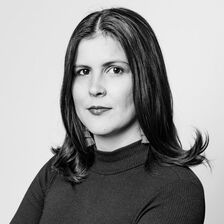
Colleen Thurston, Vision Maker Media
Tulsa, Oklahoma
Colleen Thurston is an award-winning media producer and documentary filmmaker from Tulsa, Oklahoma. She is an Assistant Professor of Journalism and teaches documentary studies and film production. As an Indigenous non-fiction storyteller, her films explore the relationships between humans and the natural world and focus on Native stories and perspectives. She holds an MFA from Montana State University’s Science and Natural History Filmmaking program, where she also earned a graduate certificate in American Indian Studies. Her BA in Media Arts and Anthropology is from the University of Arizona. Colleen has produced work for the Smithsonian Channel, Vox, illumiNATIVE and museums, public television stations, and federal and tribal organizations. She produced and directed short documentaries for four seasons of the Cherokee Nation’s series, “Osiyo, Voices of the Cherokee People,” earning two Emmy awards for her work on the show. She is currently in production on her first feature documentary “Drowned Land” which explores water rights and the history of resource exploitation in the Choctaw Nation of Oklahoma. Colleen also curates film and storytelling events, with an emphasis on Indigenous programming and is currently the co-Executive Director of the Fayetteville Film Festival. Colleen is a 2019-2021 Firelight Media Documentary Lab Fellow, a citizen of the Choctaw Nation and a seventh generation Oklahoman.
Tulsa, Oklahoma
Colleen Thurston is an award-winning media producer and documentary filmmaker from Tulsa, Oklahoma. She is an Assistant Professor of Journalism and teaches documentary studies and film production. As an Indigenous non-fiction storyteller, her films explore the relationships between humans and the natural world and focus on Native stories and perspectives. She holds an MFA from Montana State University’s Science and Natural History Filmmaking program, where she also earned a graduate certificate in American Indian Studies. Her BA in Media Arts and Anthropology is from the University of Arizona. Colleen has produced work for the Smithsonian Channel, Vox, illumiNATIVE and museums, public television stations, and federal and tribal organizations. She produced and directed short documentaries for four seasons of the Cherokee Nation’s series, “Osiyo, Voices of the Cherokee People,” earning two Emmy awards for her work on the show. She is currently in production on her first feature documentary “Drowned Land” which explores water rights and the history of resource exploitation in the Choctaw Nation of Oklahoma. Colleen also curates film and storytelling events, with an emphasis on Indigenous programming and is currently the co-Executive Director of the Fayetteville Film Festival. Colleen is a 2019-2021 Firelight Media Documentary Lab Fellow, a citizen of the Choctaw Nation and a seventh generation Oklahoman.
Jackson Wild In-Person Summit Fellows
Funding for the 2021 Jackson Wild Summit Filmmakers scholarship is made possible with generous support from Doclights GmbH, the Cornell Douglas Foundation, BBC Studios Natural History Unit, and Conservation International.
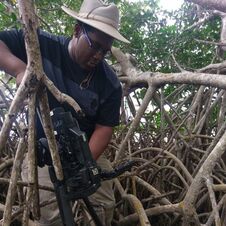
Robert Anthony Boyd III
Washington, D.C.
For his Fulbright, Robert Boyd seeks to capture never-before-seen footage of the 4-inch long spaghetti-thin Barbados Threadsnake. In 2008, scientists designated this tiny reptile as a distinct species, as well as the smallest serpent in the world. While this news initially received considerable media attention, the Barbados Threadsnake has not yet been filmed in the wild. In addition, few steps seem to have been taken to stabilize its critically endangered conservation status. With forested areas dwindling on the increasingly urbanizing island of Barbados, the Threadsnake is rapidly running out of habitat. Robert hopes his film will serve as a catalyst for renewed interest and conservation efforts, as well as an educational tool for those who have never encountered this animal. Much of Robert’s filmmaking up to this point has involved working with scientific organizations including the Virginia Institute of Marine Science, the Department of Interior, the Smithsonian, the Ocean Exploration Trust, and the National Park Service. Robert’s prior experience covering scientific and natural history subjects, coupled with his recently earned MFA from American University and the Center for Environmental Filmmaking, will be invaluable during his project in Barbados. The extinction of a 4 inch long island serpent may seem like an insignificant thing, but it represents a much larger issue. Across the globe, rising sea levels, development, and the introduction of invasive species have pushed many island animals to the brink. Like the Threadsnake, their extinction often goes overlooked by the media at large, and the communities that may inadvertently misplace them, slipping unnoticed from the world like sand through our collective fingers. Saving the Barbados Threadsnake wouldn’t just preserve one of our world’s smallest reptiles, it could serve as a rallying point for conservation initiatives aimed at protecting threatened island species across the globe.
Washington, D.C.
For his Fulbright, Robert Boyd seeks to capture never-before-seen footage of the 4-inch long spaghetti-thin Barbados Threadsnake. In 2008, scientists designated this tiny reptile as a distinct species, as well as the smallest serpent in the world. While this news initially received considerable media attention, the Barbados Threadsnake has not yet been filmed in the wild. In addition, few steps seem to have been taken to stabilize its critically endangered conservation status. With forested areas dwindling on the increasingly urbanizing island of Barbados, the Threadsnake is rapidly running out of habitat. Robert hopes his film will serve as a catalyst for renewed interest and conservation efforts, as well as an educational tool for those who have never encountered this animal. Much of Robert’s filmmaking up to this point has involved working with scientific organizations including the Virginia Institute of Marine Science, the Department of Interior, the Smithsonian, the Ocean Exploration Trust, and the National Park Service. Robert’s prior experience covering scientific and natural history subjects, coupled with his recently earned MFA from American University and the Center for Environmental Filmmaking, will be invaluable during his project in Barbados. The extinction of a 4 inch long island serpent may seem like an insignificant thing, but it represents a much larger issue. Across the globe, rising sea levels, development, and the introduction of invasive species have pushed many island animals to the brink. Like the Threadsnake, their extinction often goes overlooked by the media at large, and the communities that may inadvertently misplace them, slipping unnoticed from the world like sand through our collective fingers. Saving the Barbados Threadsnake wouldn’t just preserve one of our world’s smallest reptiles, it could serve as a rallying point for conservation initiatives aimed at protecting threatened island species across the globe.
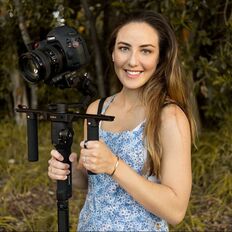
Romi Castagnino
Peru/Australia
Romi is a Peruvian conservation biologist and a freelance wildlife photographer/filmmaker. As a researcher, she focuses on tropical mammal conservation using camera traps to study how human development affects animal behavior in Peru's cloud forests and Amazon Rainforest. As a filmmaker, her latest projects include collaborations with Waterbear Network and Love Nature, and creating 'Behind The Science,' a series highlighting the work of conservation scientists across the globe. Besides freelancing, Romi works in environmental journalism at Mongabay and produces and hosts 'Candid Animal Cam' ('La Vida Secreta de Los Animales'), a bilingual educational digital series featuring wildlife caught on camera traps by researchers from all over the world. Lastly, Romi aims to produce investigative films that raise awareness of the illegal wildlife trade in South America, working alongside impact producers to make real and lasting positive impacts on the ground. You can follow her work at @romi_castagnino.
Peru/Australia
Romi is a Peruvian conservation biologist and a freelance wildlife photographer/filmmaker. As a researcher, she focuses on tropical mammal conservation using camera traps to study how human development affects animal behavior in Peru's cloud forests and Amazon Rainforest. As a filmmaker, her latest projects include collaborations with Waterbear Network and Love Nature, and creating 'Behind The Science,' a series highlighting the work of conservation scientists across the globe. Besides freelancing, Romi works in environmental journalism at Mongabay and produces and hosts 'Candid Animal Cam' ('La Vida Secreta de Los Animales'), a bilingual educational digital series featuring wildlife caught on camera traps by researchers from all over the world. Lastly, Romi aims to produce investigative films that raise awareness of the illegal wildlife trade in South America, working alongside impact producers to make real and lasting positive impacts on the ground. You can follow her work at @romi_castagnino.
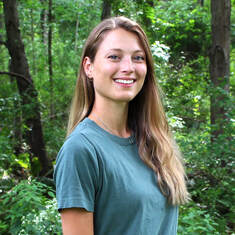
Taylor Gedeon
Washington, D.C.
Taylor Gedeon is a socio-ecological scientist and multimedia producer focused on the importance of engaging with communities to support the creation of ecologically and socially responsible policies and protected lands. She holds a Master of Science in Marine, Estuarine, and Environmental Sciences, with a concentration on the relationship between society and the environment. Her thesis examined wildlife management practices in the U.S., and the potential to further include stakeholders in management decisions to support conservation and equitable wildlife responses. Taylor also worked with a team examining beneficial dredge placement occurring in marshland along the Chesapeake Bay, bridging the gaps between the agencies involved with the values and needs of the vulnerable local population. She is currently a freelance podcast producer for the Proceedings of the National Academy of Sciences, where she works to communicate recent research to a broad audience. Taylor looks forward to a career protecting the future of people and nature worldwide through collaborative conservation and impact-driven media.
Washington, D.C.
Taylor Gedeon is a socio-ecological scientist and multimedia producer focused on the importance of engaging with communities to support the creation of ecologically and socially responsible policies and protected lands. She holds a Master of Science in Marine, Estuarine, and Environmental Sciences, with a concentration on the relationship between society and the environment. Her thesis examined wildlife management practices in the U.S., and the potential to further include stakeholders in management decisions to support conservation and equitable wildlife responses. Taylor also worked with a team examining beneficial dredge placement occurring in marshland along the Chesapeake Bay, bridging the gaps between the agencies involved with the values and needs of the vulnerable local population. She is currently a freelance podcast producer for the Proceedings of the National Academy of Sciences, where she works to communicate recent research to a broad audience. Taylor looks forward to a career protecting the future of people and nature worldwide through collaborative conservation and impact-driven media.
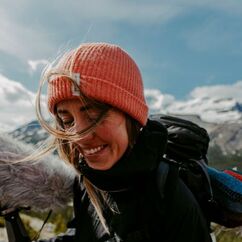
Caroline Hedin
Alberta, Canada
Caroline is a director and science communicator driven to explore underrepresented stories of discovery and culture on the leading edge of conservation. She spent a decade as a digital storytelling specialist with Parks Canada before starting her own micro production company, Transmission Media in 2020. She recently directed an award-winning web series with Parks Canada about the return of bison to Banff National Park and just wrapped her first short documentary called Rockies Repeat, which explores the cultural impacts of climate change. Her work has been featured on the National Geographic Voices Blog, Banff Mountain Film Festival, Canada History Magazine, and the Toronto Zoo. You can learn more and contact her at carolinehedin.com
Alberta, Canada
Caroline is a director and science communicator driven to explore underrepresented stories of discovery and culture on the leading edge of conservation. She spent a decade as a digital storytelling specialist with Parks Canada before starting her own micro production company, Transmission Media in 2020. She recently directed an award-winning web series with Parks Canada about the return of bison to Banff National Park and just wrapped her first short documentary called Rockies Repeat, which explores the cultural impacts of climate change. Her work has been featured on the National Geographic Voices Blog, Banff Mountain Film Festival, Canada History Magazine, and the Toronto Zoo. You can learn more and contact her at carolinehedin.com
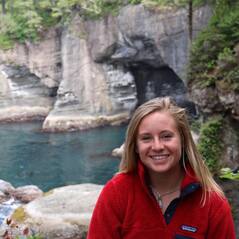
Hannah MacDonald
Newport, Rhode Island
Hannah is a science storyteller with a background in virtual reality and live programming focused on sharing the interconnectedness we have with the ocean. She has worked with organizations like NOAA’s Office of National Marine Sanctuaries, EarthEcho International and Monterey Bay Aquarium Research Institute to create content that brings the ocean to the public, encouraging them to connect and care about special marine places. She is currently an Environmental Science and Management graduate student at the University of Rhode Island where she studies environmental communication and human dynamics related to the marine environment. Hannah strives to bridge her interest in coastal community well-being and storytelling by sharing the stories of those whose livelihoods depend on the ocean whose voices are often underrepresented. She hopes that the multimedia content she creates enables us to relate to one another to foster a culture of listening that inspires kinship between people and the planet. You can check out Hannah's emerging portfolio through her website or LinkedIn.
Newport, Rhode Island
Hannah is a science storyteller with a background in virtual reality and live programming focused on sharing the interconnectedness we have with the ocean. She has worked with organizations like NOAA’s Office of National Marine Sanctuaries, EarthEcho International and Monterey Bay Aquarium Research Institute to create content that brings the ocean to the public, encouraging them to connect and care about special marine places. She is currently an Environmental Science and Management graduate student at the University of Rhode Island where she studies environmental communication and human dynamics related to the marine environment. Hannah strives to bridge her interest in coastal community well-being and storytelling by sharing the stories of those whose livelihoods depend on the ocean whose voices are often underrepresented. She hopes that the multimedia content she creates enables us to relate to one another to foster a culture of listening that inspires kinship between people and the planet. You can check out Hannah's emerging portfolio through her website or LinkedIn.
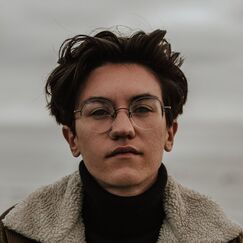
Angel Morris
San Diego, California
Angel is a nonbinary editor and filmmaker based in San Diego, California. After spending almost ten years editing for advertisements and commercials, Angel decided to chase their passion to cut for documentaries. They aim to work on films that make an impact in wildlife conservation and beyond. Although Angel’s skill set spans many areas of film production, editing is what brings them the most joy, as it’s where all the pieces of the puzzle are brought together to make the story. One of Angel’s goals is to diversify the community of documentary filmmakers. As someone who is a part of the LGBTQ+ community and identifies as nonbinary, it is rare for them to see people who look like them in the industry. They hope to eventually inspire others who are like them to chase after their aspirations so that more stories can be heard, and more work can be done to take care of our planet and those on it.
San Diego, California
Angel is a nonbinary editor and filmmaker based in San Diego, California. After spending almost ten years editing for advertisements and commercials, Angel decided to chase their passion to cut for documentaries. They aim to work on films that make an impact in wildlife conservation and beyond. Although Angel’s skill set spans many areas of film production, editing is what brings them the most joy, as it’s where all the pieces of the puzzle are brought together to make the story. One of Angel’s goals is to diversify the community of documentary filmmakers. As someone who is a part of the LGBTQ+ community and identifies as nonbinary, it is rare for them to see people who look like them in the industry. They hope to eventually inspire others who are like them to chase after their aspirations so that more stories can be heard, and more work can be done to take care of our planet and those on it.
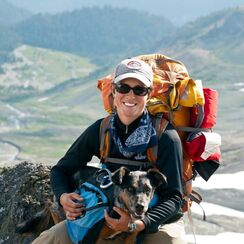
Ramey Newell
Oregon/British Columbia, Canada
Ramey Newell is an independent filmmaker and multidisciplinary artist who splits her time between British Columbia and Oregon. Growing up in the Pacific Northwest, Ramey gained an early appreciation for open spaces, forests, mountains, and wildlife—an affinity that has persisted throughout her adult life and permeates much of her creative work. Her short experimental and documentary films have been screened at various festivals and in galleries, museums and other art spaces throughout the United States, Canada, the United Kingdom, Europe, and Australia, including: the National Gallery of Art in Washington, D.C.; Mountainfilm in Telluride, Colorado; Alchemy Moving Image Festival in Hawick, Scotland; SCINEMA International Science Film Festival in Australia; Wild and Scenic Film Festival in Nevada City, California; and many others. Ramey’s work has also earned accolades such as the Jury’s Stellar Award (Grand Prize) at Black Maria Film Festival (2018) and Best Director at Mirror Mountain Film Festival (2017). Ramey holds a Bachelor of Fine Arts in Photography from New Mexico State University, a Graduate Certificate in Interdisciplinary Documentary Media Practices from the University of Colorado at Boulder, and a Master of Fine Arts in Visual Art from the University of British Columbia. She now teaches photography, video, and documentary production at the University of British Columbia Okanagan. Ramey was also a 2016 Flaherty Seminar Fellow, a 2019 IWFF Filmmaker Labs Fellow, and a 2019 Independent Imaging Film Farm participant. She is currently in production on her first feature-length documentary, “A Good Wolf” (www.goodwolffilm.com).
Oregon/British Columbia, Canada
Ramey Newell is an independent filmmaker and multidisciplinary artist who splits her time between British Columbia and Oregon. Growing up in the Pacific Northwest, Ramey gained an early appreciation for open spaces, forests, mountains, and wildlife—an affinity that has persisted throughout her adult life and permeates much of her creative work. Her short experimental and documentary films have been screened at various festivals and in galleries, museums and other art spaces throughout the United States, Canada, the United Kingdom, Europe, and Australia, including: the National Gallery of Art in Washington, D.C.; Mountainfilm in Telluride, Colorado; Alchemy Moving Image Festival in Hawick, Scotland; SCINEMA International Science Film Festival in Australia; Wild and Scenic Film Festival in Nevada City, California; and many others. Ramey’s work has also earned accolades such as the Jury’s Stellar Award (Grand Prize) at Black Maria Film Festival (2018) and Best Director at Mirror Mountain Film Festival (2017). Ramey holds a Bachelor of Fine Arts in Photography from New Mexico State University, a Graduate Certificate in Interdisciplinary Documentary Media Practices from the University of Colorado at Boulder, and a Master of Fine Arts in Visual Art from the University of British Columbia. She now teaches photography, video, and documentary production at the University of British Columbia Okanagan. Ramey was also a 2016 Flaherty Seminar Fellow, a 2019 IWFF Filmmaker Labs Fellow, and a 2019 Independent Imaging Film Farm participant. She is currently in production on her first feature-length documentary, “A Good Wolf” (www.goodwolffilm.com).
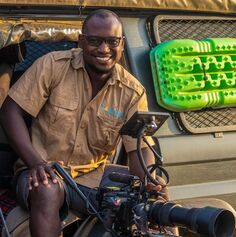
Hans Cosmas Ngoteya
Dar es Salaam, Tanzania
Hans Cosmas Ngoteya is a conservationist from Tanzania, a National Geographic Explorer, expedition expert, and a professional in wildlife photography and filming. He is a co-founder of Ngoteya Wild, a Tanzanian wildlife and conservation storytelling company were he works as a director and documentary cinematographer. He has worked with local and international organizations to tell impactful stories about their work and with NHK Wild Japan to produce a wildlife behavior documentary in the Serengeti. Also he is a co-founder of Tanzania Wildlife Media Association (TaWiMA) an association of professional Tanzanian wildlife content creators with the aim of marketing, promoting and educating about Tanzania’s wildlife resources, through which he has trained nine young Tanzanians in the last three years who are now among the top wildlife filmmakers and photographers in the country. Additionally, he has co-founded Landscape and Conservation Mentors Organization (LCMO), an organization which focuses on promoting, supporting, and improving community livelihoods through sustainable environmental practices. His ultimate goal is to develop and explore practical solutions to solving emerging conservation challenges and help communities co-exist with wildlife. Read more about Hans: www.hanscosmasngoteya.com, www.ngoteyawild.co.tz
Dar es Salaam, Tanzania
Hans Cosmas Ngoteya is a conservationist from Tanzania, a National Geographic Explorer, expedition expert, and a professional in wildlife photography and filming. He is a co-founder of Ngoteya Wild, a Tanzanian wildlife and conservation storytelling company were he works as a director and documentary cinematographer. He has worked with local and international organizations to tell impactful stories about their work and with NHK Wild Japan to produce a wildlife behavior documentary in the Serengeti. Also he is a co-founder of Tanzania Wildlife Media Association (TaWiMA) an association of professional Tanzanian wildlife content creators with the aim of marketing, promoting and educating about Tanzania’s wildlife resources, through which he has trained nine young Tanzanians in the last three years who are now among the top wildlife filmmakers and photographers in the country. Additionally, he has co-founded Landscape and Conservation Mentors Organization (LCMO), an organization which focuses on promoting, supporting, and improving community livelihoods through sustainable environmental practices. His ultimate goal is to develop and explore practical solutions to solving emerging conservation challenges and help communities co-exist with wildlife. Read more about Hans: www.hanscosmasngoteya.com, www.ngoteyawild.co.tz
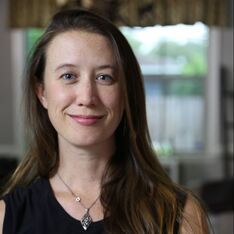
Mariah Wilson
Brooklyn, New York
Mariah Wilson is a documentary producer and director with a focus on wildlife conservation whose work has taken her to six continents. She has produced for PBS, Netflix, National Geographic, Vice, A&E, History, Mongabay, Discovery, Animal Planet, and others. Her feature documentary Silent Forests (2019) is about the fight to save forest elephants from ivory trafficking in Africa’s Congo Basin. It screened at Santa Barbara Film Festival, Big Sky Doc Fest (Finalist – Feature Competition), Brooklyn Film Festival (Spirit Award), Jackson Hole World Wildlife Day (Winner – Stories of Hope) and is a One World Media Award Winner. Mariah has worked on Andrew Berends’ Madina’s Dream (SXSW, Telluride Mountainfilm), and Windy Borman’s Mary Janes (Woodstock, Mill Valley) and is currently co-producing Raising Khan (Sundance Documentary Fund). She is passionate about illuminating the myriad intersections between humans and animals, and celebrating those dedicated to protecting wildlife. She has a special focus on under-reported species and regions, and the pressing conservation issues they face. More at: www.mariahewilson.com
Brooklyn, New York
Mariah Wilson is a documentary producer and director with a focus on wildlife conservation whose work has taken her to six continents. She has produced for PBS, Netflix, National Geographic, Vice, A&E, History, Mongabay, Discovery, Animal Planet, and others. Her feature documentary Silent Forests (2019) is about the fight to save forest elephants from ivory trafficking in Africa’s Congo Basin. It screened at Santa Barbara Film Festival, Big Sky Doc Fest (Finalist – Feature Competition), Brooklyn Film Festival (Spirit Award), Jackson Hole World Wildlife Day (Winner – Stories of Hope) and is a One World Media Award Winner. Mariah has worked on Andrew Berends’ Madina’s Dream (SXSW, Telluride Mountainfilm), and Windy Borman’s Mary Janes (Woodstock, Mill Valley) and is currently co-producing Raising Khan (Sundance Documentary Fund). She is passionate about illuminating the myriad intersections between humans and animals, and celebrating those dedicated to protecting wildlife. She has a special focus on under-reported species and regions, and the pressing conservation issues they face. More at: www.mariahewilson.com
Jackson Wild Virtual Summit Fellows
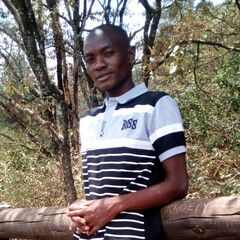
Neville Agesa
Diani Beach, Kenya
Neville Agesa is a wildlife specialist, he is involved in the following; research (ecological monitoring and environmental assessment), Conservation education (dissemination of conservation information to the public). Community conservation (community relations and reducing human wildlife conflict community conservations projects. Neville holds a Diploma in community wildlife management from Kenya wildlife service’s training institute.
He helps conservationist to collect data, monitor species and their habitats and do outreach programmes thereby providing useful information for sound conservation and decision-making process in turtle conservation.
Neville is a self-inspired motivated and outgoing nature lover with a heart of conservation.
Diani Beach, Kenya
Neville Agesa is a wildlife specialist, he is involved in the following; research (ecological monitoring and environmental assessment), Conservation education (dissemination of conservation information to the public). Community conservation (community relations and reducing human wildlife conflict community conservations projects. Neville holds a Diploma in community wildlife management from Kenya wildlife service’s training institute.
He helps conservationist to collect data, monitor species and their habitats and do outreach programmes thereby providing useful information for sound conservation and decision-making process in turtle conservation.
Neville is a self-inspired motivated and outgoing nature lover with a heart of conservation.
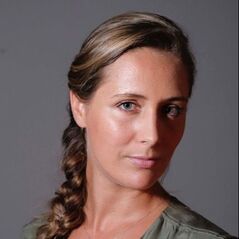
Aletta Harrison
Kent, United Kingdom
Aletta is a South African multimedia journalist and senior lecturer with a passion for environmental and conservation stories. After emigrating to the UK as a teenager she finished her education and returned to her birth country in 2010, where she worked as a video and photojournalist for a decade. During her time in Cape Town, she developed a special interest in environmental issues and gained recognition for her coverage of water pollution, marine poaching and drought. Working as a news reporter presented many opportunities to highlight various threats to the unique animals and plants of the Cape, a uniquely biodiverse corner of the world. Since 2020 she has been living in the UK where she is teaching journalism and working on a transition into long-form video projects with a special focus on conservation and environmental topics.
Kent, United Kingdom
Aletta is a South African multimedia journalist and senior lecturer with a passion for environmental and conservation stories. After emigrating to the UK as a teenager she finished her education and returned to her birth country in 2010, where she worked as a video and photojournalist for a decade. During her time in Cape Town, she developed a special interest in environmental issues and gained recognition for her coverage of water pollution, marine poaching and drought. Working as a news reporter presented many opportunities to highlight various threats to the unique animals and plants of the Cape, a uniquely biodiverse corner of the world. Since 2020 she has been living in the UK where she is teaching journalism and working on a transition into long-form video projects with a special focus on conservation and environmental topics.
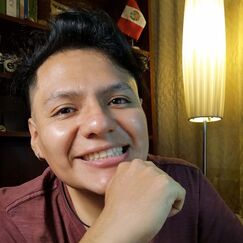
Diego Alberto Gamero Huayhua
Lima, Peru
I am a Peruvian marine biologist, and self-taught photographer and filmmaker. For about ten years I directed my career to the study of marine invertebrate diversity of Tropical Eastern Pacific. It was my intention to get a PhD one day, however once I got my master degree, I found out that my passion for media was bigger than being a scientist. Since 2019, I have been collaborating in science communication projects. I love to engage people in science and conservation through the emotional power of storytelling, imagery and sound design. I also create content for YouTube. I want to teach people how to photograph, film and edit. Since I started to interact with nature while I was holding a camera, my admiration and love for wildlife increased. I want the same for people, I want them to love nature and protect it. My dream is to direct my own production company to influence people's conscience to create a world where people and nature can thrive.
Lima, Peru
I am a Peruvian marine biologist, and self-taught photographer and filmmaker. For about ten years I directed my career to the study of marine invertebrate diversity of Tropical Eastern Pacific. It was my intention to get a PhD one day, however once I got my master degree, I found out that my passion for media was bigger than being a scientist. Since 2019, I have been collaborating in science communication projects. I love to engage people in science and conservation through the emotional power of storytelling, imagery and sound design. I also create content for YouTube. I want to teach people how to photograph, film and edit. Since I started to interact with nature while I was holding a camera, my admiration and love for wildlife increased. I want the same for people, I want them to love nature and protect it. My dream is to direct my own production company to influence people's conscience to create a world where people and nature can thrive.
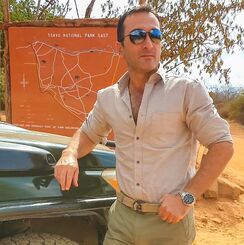
Shazaad Kasmani
Mombasa, Kenya
Born and raised in Kenya, I am Wildlife and Underwater Cameraman experienced working Kenyan National Parks and Marine Parks. I feel most at home when out in nature and am passionate about filming and photographing both Wildlife and Marine life. I love displaying their unique behavior, their extraordinary natural habitats and showcasing the fascinating lives that they live. My work has been published by National Geographic and other recognised international media. My fondness for natural history inclines me to also write and publish articles & photographs for various locally based newspapers, international magazines and conservation organizations. Being regularly out on location in the Kenyan wilderness, I have developed a sixth sense when it comes to animal behavior and have also offered my expertise to wildlife documentary filmmakers and researchers. One of my proudest achievements was when I was appointed by the Kenya Wildlife Service as an Honorary Game Warden after years of dedication to saving distressed and injured wildlife, leading conservation projects, law enforcement and also educating the public on our country's wildlife heritage.
Mombasa, Kenya
Born and raised in Kenya, I am Wildlife and Underwater Cameraman experienced working Kenyan National Parks and Marine Parks. I feel most at home when out in nature and am passionate about filming and photographing both Wildlife and Marine life. I love displaying their unique behavior, their extraordinary natural habitats and showcasing the fascinating lives that they live. My work has been published by National Geographic and other recognised international media. My fondness for natural history inclines me to also write and publish articles & photographs for various locally based newspapers, international magazines and conservation organizations. Being regularly out on location in the Kenyan wilderness, I have developed a sixth sense when it comes to animal behavior and have also offered my expertise to wildlife documentary filmmakers and researchers. One of my proudest achievements was when I was appointed by the Kenya Wildlife Service as an Honorary Game Warden after years of dedication to saving distressed and injured wildlife, leading conservation projects, law enforcement and also educating the public on our country's wildlife heritage.
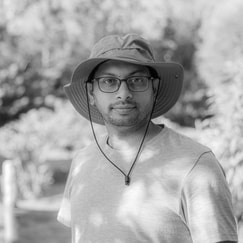
Sumanth Kuduvalli
Bangalore, India
Sumanth Kuduvalli, Co-founder of Trailing Wild Productions, is an award-winning natural history filmmaker from Bengaluru. He finished his diploma in filmmaking from Delhi and worked as a Technical Executive for Nikon India Pvt limited, following which he worked as a freelance natural history cameraman before he founded Trailing Wild Productions. He has been in the forefront of the Indian wildlife filmmaking scene, working on numerous projects for a variety of production houses both in India and away. As a freelance cameraman he was involved in various projects including the BBC Wonders of the Monsoon with the Felis creations team, an 8-part documentary project with ATREE and CEPF, River Terns of Bhadra with Mudskipper, Counting Rhinos with Felis creations for WWF UK (Image featured in one of world’s top 15 conservation efforts by WWF in 2015), “Wild Karnataka” narrated by Sir David Attenborough. He was the first cameraman to film the rare and endangered “Sangai” for the “The Return of Sangai” documentary for a fellow award-winning Filmmaker and Editor George Thengummoottil. His directorial debut “The Naga Pride” with Gypsy Tiger Productions was an award-winning film which travelled to 8 different countries and received 12 official nominations across the globe and a best Indian documentary award at the Nagaon International Film Festival. His documentary film “Communities and Sustainability”, a conservation project with ATREE & USAID on one of India’s oldest tribes and communities in the foothills of the Himalayas, was one of the nominated films in the coveted International film festival by Vigyan Prasar under the Ministry of Information and Broadcast. He is currently working on a Coffee Table Book project named “Food Futures” showcasing the food of tribes living on the Cauvery river basin in Karnataka. The book is a sneak peek into our food history trying to reveal food practices that are not only beneficial to us, but also a small step towards reducing our carbon footprint and help fight the climate change issue.
Bangalore, India
Sumanth Kuduvalli, Co-founder of Trailing Wild Productions, is an award-winning natural history filmmaker from Bengaluru. He finished his diploma in filmmaking from Delhi and worked as a Technical Executive for Nikon India Pvt limited, following which he worked as a freelance natural history cameraman before he founded Trailing Wild Productions. He has been in the forefront of the Indian wildlife filmmaking scene, working on numerous projects for a variety of production houses both in India and away. As a freelance cameraman he was involved in various projects including the BBC Wonders of the Monsoon with the Felis creations team, an 8-part documentary project with ATREE and CEPF, River Terns of Bhadra with Mudskipper, Counting Rhinos with Felis creations for WWF UK (Image featured in one of world’s top 15 conservation efforts by WWF in 2015), “Wild Karnataka” narrated by Sir David Attenborough. He was the first cameraman to film the rare and endangered “Sangai” for the “The Return of Sangai” documentary for a fellow award-winning Filmmaker and Editor George Thengummoottil. His directorial debut “The Naga Pride” with Gypsy Tiger Productions was an award-winning film which travelled to 8 different countries and received 12 official nominations across the globe and a best Indian documentary award at the Nagaon International Film Festival. His documentary film “Communities and Sustainability”, a conservation project with ATREE & USAID on one of India’s oldest tribes and communities in the foothills of the Himalayas, was one of the nominated films in the coveted International film festival by Vigyan Prasar under the Ministry of Information and Broadcast. He is currently working on a Coffee Table Book project named “Food Futures” showcasing the food of tribes living on the Cauvery river basin in Karnataka. The book is a sneak peek into our food history trying to reveal food practices that are not only beneficial to us, but also a small step towards reducing our carbon footprint and help fight the climate change issue.
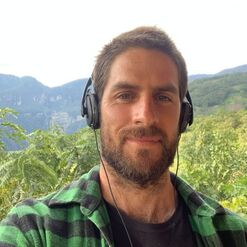
Bruno Monteferri
Lima, Peru
Bruno Monteferri connects people and nature. Bruno is an Ashoka Fellow, environmental lawyer and an MPhil in Conservation Leadership from the University of Cambridge. He has worked for over a decade in the Peruvian Society for Environmental Law supporting the creation and management of private and public protected areas. In 2012 he founded Conservamos por Naturaleza, an initiative that gives Peruvians a platform to share their sustainability stories with the world. He has published several books and also directed over 50 short videos, including A la Mar and The Roar of the Marañon. Ultimately, he works to inspire others to connect with nature and take action for the planet.
Lima, Peru
Bruno Monteferri connects people and nature. Bruno is an Ashoka Fellow, environmental lawyer and an MPhil in Conservation Leadership from the University of Cambridge. He has worked for over a decade in the Peruvian Society for Environmental Law supporting the creation and management of private and public protected areas. In 2012 he founded Conservamos por Naturaleza, an initiative that gives Peruvians a platform to share their sustainability stories with the world. He has published several books and also directed over 50 short videos, including A la Mar and The Roar of the Marañon. Ultimately, he works to inspire others to connect with nature and take action for the planet.

Zandile Ndhlovu
Johannesburg, South Africa
My name is Zandile Ndhlovu, I am a Freediving Instructor based in South Africa, and the founder of The Black Mermaid Foundation, an organization seeking to create diverse representation in the Ocean Arena. As an emerging Filmmaker, I look forward to telling African stories in relation to the water, focusing on indigenous knowledge, conservation and exploration.
Johannesburg, South Africa
My name is Zandile Ndhlovu, I am a Freediving Instructor based in South Africa, and the founder of The Black Mermaid Foundation, an organization seeking to create diverse representation in the Ocean Arena. As an emerging Filmmaker, I look forward to telling African stories in relation to the water, focusing on indigenous knowledge, conservation and exploration.
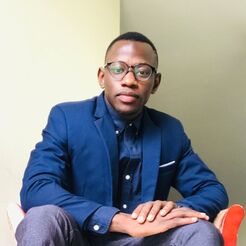
Dembo Jatta
Kigali, Rwanda
My name is Dembo Jatta and I'm a student at the School of Wildlife Conservation at the African Leadership University in Kigali, Rwanda. For my undergraduate degree, I'm studying global challenges with a focus on wildlife conservation. Since I was a child growing up in a rural village on the Atlantic coast of The Gambia, I've wanted to work in wildlife conservation, to help conserve endangered wild animals species and to protect important natural habitats. This led to my first volunteer experiences, and subsequent employment, as a research assistant at a bird conservation organization based in my village. Working for considerable periods in the field, conducting surveys and scientific research on the local birds and other wildlife, has taught me about the importance of wildlife photography and how it can help with effective data collection. One of the projects I was responsible for involved conducting daily surveys to document and count birds that migrate from Europe to West Africa for the winter months. During these surveys, I was able to photograph a large number of birds that had been tagged with unique coded leg rings, allowing us to identify them individually and report back to where they had originally been ringed on their breeding grounds. Through this work, I realized that wildlife photography and, crucially, good fieldcraft to get close to wild animals without disturbing them, has the potential to be a key part of my conservation work. I am sure that attending the Jackson Wild Fellowship program will assist me in developing and improving my photographic skills.
Kigali, Rwanda
My name is Dembo Jatta and I'm a student at the School of Wildlife Conservation at the African Leadership University in Kigali, Rwanda. For my undergraduate degree, I'm studying global challenges with a focus on wildlife conservation. Since I was a child growing up in a rural village on the Atlantic coast of The Gambia, I've wanted to work in wildlife conservation, to help conserve endangered wild animals species and to protect important natural habitats. This led to my first volunteer experiences, and subsequent employment, as a research assistant at a bird conservation organization based in my village. Working for considerable periods in the field, conducting surveys and scientific research on the local birds and other wildlife, has taught me about the importance of wildlife photography and how it can help with effective data collection. One of the projects I was responsible for involved conducting daily surveys to document and count birds that migrate from Europe to West Africa for the winter months. During these surveys, I was able to photograph a large number of birds that had been tagged with unique coded leg rings, allowing us to identify them individually and report back to where they had originally been ringed on their breeding grounds. Through this work, I realized that wildlife photography and, crucially, good fieldcraft to get close to wild animals without disturbing them, has the potential to be a key part of my conservation work. I am sure that attending the Jackson Wild Fellowship program will assist me in developing and improving my photographic skills.
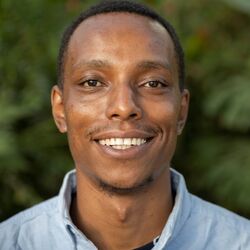
Kennedy Kariuki
Nairobi, Kenya
Kennedy Kariuki's penchant for adventure and the protection of nature has led him to work on different projects in East Africa focusing on issues ranging from wildlife research and management to community capacity building and public-private partnerships. He has worked on different species spanning from cetaceans and primates to his current focus on large carnivores in the Meru Conservation Area in Kenya. Kennedy has recently taken up filmmaking and is looking to make a short film to create awareness of his work in the Meru landscape and is very excited to discuss more about the project and possible collaborations.
Nairobi, Kenya
Kennedy Kariuki's penchant for adventure and the protection of nature has led him to work on different projects in East Africa focusing on issues ranging from wildlife research and management to community capacity building and public-private partnerships. He has worked on different species spanning from cetaceans and primates to his current focus on large carnivores in the Meru Conservation Area in Kenya. Kennedy has recently taken up filmmaking and is looking to make a short film to create awareness of his work in the Meru landscape and is very excited to discuss more about the project and possible collaborations.
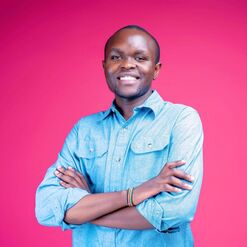
Dibblex Lesalon
Nairobi, Kenya
Dibblex Lesalon is the founder and host of Boots on the ground podcast, an interview style podcast that focuses on addressing three main issues including; Wildlife conservation, biodiversity preservation, and climate change. With a degree of Tourism management under his belt from Strathmore University in Nairobi, Kenya, Dibblex is passionate and knowledgeable about what he does. Having grown up in a small town called Narok neighboring the Maasai Mara national reserve, he developed a keen interest in wildlife and people from a very young age. Dibblex did his final year University project in Namunyak Conservancy, Samburu County in 2017, to assess the level of host community participation in the development and management of Tourism. This fueled his passion for conservation further even further. Dibblex has been fortunate enough to hold various roles in the tourism and hospitality industry in Kenya his last one working as a reservations officer at the Safari and Conservation Company in Nairobi up until Covid-19. Dibblex’s goal is to amplify African voices in the conservation space. His long term vision is to get to the ground and do stories about exemplary men and women who are going out of their way to do all they can to ensure that our wildlife, key habitats, and people survive and thrive across Africa.
Nairobi, Kenya
Dibblex Lesalon is the founder and host of Boots on the ground podcast, an interview style podcast that focuses on addressing three main issues including; Wildlife conservation, biodiversity preservation, and climate change. With a degree of Tourism management under his belt from Strathmore University in Nairobi, Kenya, Dibblex is passionate and knowledgeable about what he does. Having grown up in a small town called Narok neighboring the Maasai Mara national reserve, he developed a keen interest in wildlife and people from a very young age. Dibblex did his final year University project in Namunyak Conservancy, Samburu County in 2017, to assess the level of host community participation in the development and management of Tourism. This fueled his passion for conservation further even further. Dibblex has been fortunate enough to hold various roles in the tourism and hospitality industry in Kenya his last one working as a reservations officer at the Safari and Conservation Company in Nairobi up until Covid-19. Dibblex’s goal is to amplify African voices in the conservation space. His long term vision is to get to the ground and do stories about exemplary men and women who are going out of their way to do all they can to ensure that our wildlife, key habitats, and people survive and thrive across Africa.
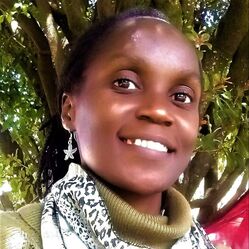
Martha Mutiso
Nairobi, Kenya
I’m Martha Mutiso, a freelance tour guide, conservation photographer and filmmaker based in Nairobi, Kenya. I am a African Conservation Voices Media Lab Fellow and I am passionate about nature, conservation and ecotourism. I have extensive experience working with numerous communities in the tourism and conservation fields. I am inspired by life, colour, and nature and love to embrace life in all forms. I feel more alive in nature where there’s always a new story to witness and share through photography, film and writing. My work has been published in various platforms; and is a reflection of the places, wildlife and people that inspire me.
Nairobi, Kenya
I’m Martha Mutiso, a freelance tour guide, conservation photographer and filmmaker based in Nairobi, Kenya. I am a African Conservation Voices Media Lab Fellow and I am passionate about nature, conservation and ecotourism. I have extensive experience working with numerous communities in the tourism and conservation fields. I am inspired by life, colour, and nature and love to embrace life in all forms. I feel more alive in nature where there’s always a new story to witness and share through photography, film and writing. My work has been published in various platforms; and is a reflection of the places, wildlife and people that inspire me.
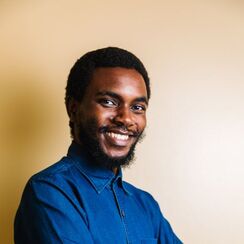
Peter Ndung’u
Nairobi, Kenya
Peter Ndung’u is an award winning visual storyteller from Nairobi, Kenya with a passion for documenting and sharing nature, wildlife and people stories using photography, film and occasional writing as his preferred mediums. His journey has seen him document stories and work across Africa for 6 years. His work has also been featured on global platforms and publications such as Apple, QZ and National Geographic in addition to being exhibited on several occasions. He holds an LLB from Strathmore Law School through which he combines his love for storytelling and legal knowledge to help advocate for change. Peter’s goal is to ultimately get people to learn more about nature, wildlife and culture while encouraging them to actively get involved in conserving the beauty that Africa has to offer. You can see his work on his website.
Nairobi, Kenya
Peter Ndung’u is an award winning visual storyteller from Nairobi, Kenya with a passion for documenting and sharing nature, wildlife and people stories using photography, film and occasional writing as his preferred mediums. His journey has seen him document stories and work across Africa for 6 years. His work has also been featured on global platforms and publications such as Apple, QZ and National Geographic in addition to being exhibited on several occasions. He holds an LLB from Strathmore Law School through which he combines his love for storytelling and legal knowledge to help advocate for change. Peter’s goal is to ultimately get people to learn more about nature, wildlife and culture while encouraging them to actively get involved in conserving the beauty that Africa has to offer. You can see his work on his website.
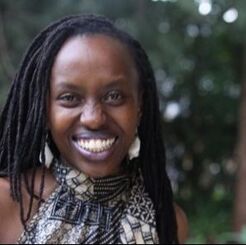
Kiki Cheptoo Ng’ok
Nairobi, Kenya
Kiki Cheptoo Ng’ok is a documentary filmmaker and speaker engaged in the pursuit of nuanced storytelling around African people, environment, societies and cultures. In seeking the “untold” African stories and the complexities around them, she hopes to highlight connections that exist between indigenous Africans, their landscapes, fauna and flora. Based in Kenya she works locally but thinks globally, recognizing how important it is that Africans tell their own stories using different platforms. A 2019 National Geographic Explorer, she was also a participant in the inaugural class of the National Geographic Field Ready program and the 2020 Jackson Wild-Kenya Virtual Summit. She sees the giraffe as her totem animal.
Nairobi, Kenya
Kiki Cheptoo Ng’ok is a documentary filmmaker and speaker engaged in the pursuit of nuanced storytelling around African people, environment, societies and cultures. In seeking the “untold” African stories and the complexities around them, she hopes to highlight connections that exist between indigenous Africans, their landscapes, fauna and flora. Based in Kenya she works locally but thinks globally, recognizing how important it is that Africans tell their own stories using different platforms. A 2019 National Geographic Explorer, she was also a participant in the inaugural class of the National Geographic Field Ready program and the 2020 Jackson Wild-Kenya Virtual Summit. She sees the giraffe as her totem animal.
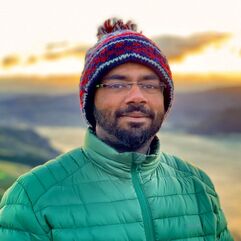
Karthic
Dunedin, New Zealand
Karthic is a filmmaker and wildlife content creator exploring diverse forms of storytelling- filmmaking, podcasting and immersive experiences. In 2017, an Automobile Engineer by qualification and profession, he decided to pursue filmmaking to tell stories of the environment. He completed a postgraduate course in Science Communication from the University of Otago. His graduation film Sniper about a conservation dog protecting Yellow-eyed Penguins won an award and has been screened globally. His podcast on Urban Green Spaces has been featured on NZ’s public broadcaster RNZ’s Our Changing World programme. His work ranges from producing independent short films & podcasts, freelancing with NHNZ Worldwide as an Assistant Producer and Researcher on TV shows for Nat Geo Wild & Love Nature, to conducting hands-on science filmmaking workshops for school students.He aims to connect people with nature and wild places through films and media. He is from Tamil Nadu, India and is currently based in Dunedin, New Zealand. Website - karthicss.com
Dunedin, New Zealand
Karthic is a filmmaker and wildlife content creator exploring diverse forms of storytelling- filmmaking, podcasting and immersive experiences. In 2017, an Automobile Engineer by qualification and profession, he decided to pursue filmmaking to tell stories of the environment. He completed a postgraduate course in Science Communication from the University of Otago. His graduation film Sniper about a conservation dog protecting Yellow-eyed Penguins won an award and has been screened globally. His podcast on Urban Green Spaces has been featured on NZ’s public broadcaster RNZ’s Our Changing World programme. His work ranges from producing independent short films & podcasts, freelancing with NHNZ Worldwide as an Assistant Producer and Researcher on TV shows for Nat Geo Wild & Love Nature, to conducting hands-on science filmmaking workshops for school students.He aims to connect people with nature and wild places through films and media. He is from Tamil Nadu, India and is currently based in Dunedin, New Zealand. Website - karthicss.com
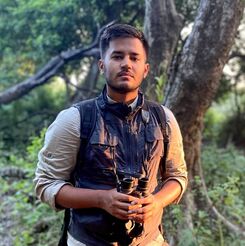
Abhinandan Sharma
New Delhi, India
Abhinandan Sharma is a 24 year old independent filmmaker and cinematographer who lives to tell stories about the natural world. His work primarily revolves around our connection to the natural world, wildlife and conservation. He works with both still and moving images to bridge the broken gap between man and nature. After completing his Bachelor's degree in films from the University of Mumbai, Abhinandan has worked on a variety of wildlife films and documentaries across India. He has worked alongside the likes of RoundGlass Sustain, Vice Asia, Snow Leopard Trust, Nature Conservation Foundation, UNICEF, Riverbank Studios and MoonPeak films as a director and cinematographer, producing value based and conservation films. He is currently working on a wildlife conservation series about the Bharatpur Bird Sanctuary in Rajasthan, India.
New Delhi, India
Abhinandan Sharma is a 24 year old independent filmmaker and cinematographer who lives to tell stories about the natural world. His work primarily revolves around our connection to the natural world, wildlife and conservation. He works with both still and moving images to bridge the broken gap between man and nature. After completing his Bachelor's degree in films from the University of Mumbai, Abhinandan has worked on a variety of wildlife films and documentaries across India. He has worked alongside the likes of RoundGlass Sustain, Vice Asia, Snow Leopard Trust, Nature Conservation Foundation, UNICEF, Riverbank Studios and MoonPeak films as a director and cinematographer, producing value based and conservation films. He is currently working on a wildlife conservation series about the Bharatpur Bird Sanctuary in Rajasthan, India.
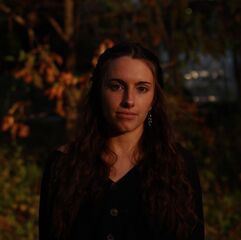
Darian Woehr
Silver Spring, Maryland
Darian Woehr is an award-winning documentary filmmaker currently traveling through Latin America. She is drawn to stories at the nexus of gender, environments, and defining home, that occur at pivotal moments in history but are often missing from the headlines. Darian is a founder of The Home Collective, a long term documentary project exploring the concept of home and its definitive role in shaping our future. She is a member of The Women Photojournalists of Washington, The Video Consortium, Her Wild Vision Initiative and The Jackson Wild Collective. Her work has been featured in publications such as The Washington Post, Associated Press, BBC, HuffPost and NPR.
Silver Spring, Maryland
Darian Woehr is an award-winning documentary filmmaker currently traveling through Latin America. She is drawn to stories at the nexus of gender, environments, and defining home, that occur at pivotal moments in history but are often missing from the headlines. Darian is a founder of The Home Collective, a long term documentary project exploring the concept of home and its definitive role in shaping our future. She is a member of The Women Photojournalists of Washington, The Video Consortium, Her Wild Vision Initiative and The Jackson Wild Collective. Her work has been featured in publications such as The Washington Post, Associated Press, BBC, HuffPost and NPR.










